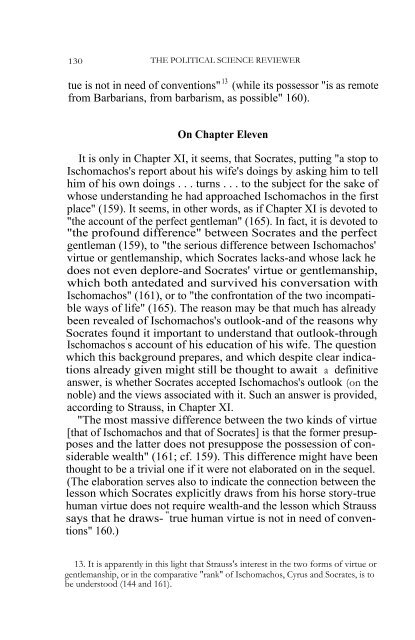Strauss on Xenophon's Socrates Xenophon's Socratic Discourse: An ...
Strauss on Xenophon's Socrates Xenophon's Socratic Discourse: An ...
Strauss on Xenophon's Socrates Xenophon's Socratic Discourse: An ...
Create successful ePaper yourself
Turn your PDF publications into a flip-book with our unique Google optimized e-Paper software.
130<br />
THE POLITICAL SCIENCE REVIEWER<br />
tue is not in need of c<strong>on</strong>venti<strong>on</strong>s" 13 (while its possessor "is as remote<br />
from Barbarians, from barbarism, as possible" 160).<br />
On Chapter Eleven<br />
It is <strong>on</strong>ly in Chapter XI, it seems, that <strong>Socrates</strong>, putting "a stop to<br />
Ischomachos's report about his wife's doings by asking him to tell<br />
him of his own doings . . . turns . . . to the subject for the sake of<br />
whose understanding he had approached Ischomachos in the first<br />
place" (159). It seems, in other words, as if Chapter XI is devoted to<br />
"the account of the perfect gentleman" (165). In fact, it is devoted to<br />
"the profound difference" between <strong>Socrates</strong> and the perfect<br />
gentleman (159), to "the serious difference between Ischomachos'<br />
virtue or gentlemanship, which <strong>Socrates</strong> lacks-and whose lack he<br />
does not even deplore-and <strong>Socrates</strong>' virtue or gentlemanship,<br />
which both antedated and survived his c<strong>on</strong>versati<strong>on</strong> with<br />
Ischomachos" (161), or to "the c<strong>on</strong>fr<strong>on</strong>tati<strong>on</strong> of the two incompatible<br />
ways of life" (165). The reas<strong>on</strong> may be that much has already<br />
been revealed of Ischomachos's outlook-and of the reas<strong>on</strong>s why<br />
<strong>Socrates</strong> found it important to understand that outlook-through<br />
Ischomachos ' s account of his educati<strong>on</strong> of his wife. The questi<strong>on</strong><br />
which this background prepares, and which despite clear indicati<strong>on</strong>s<br />
already given might still be thought to await a definitive<br />
answer, is whether <strong>Socrates</strong> accepted Ischomachos's outlook (<strong>on</strong> the<br />
noble) and the views associated with it. Such an answer is provided,<br />
according to <str<strong>on</strong>g>Strauss</str<strong>on</strong>g>, in Chapter XI.<br />
"The most massive difference between the two kinds of virtue<br />
[that of Ischomachos and that of <strong>Socrates</strong>] is that the former presupposes<br />
and the latter does not presuppose the possessi<strong>on</strong> of c<strong>on</strong>siderable<br />
wealth" (161; cf. 159). This difference might have been<br />
thought to be a trivial <strong>on</strong>e if it were not elaborated <strong>on</strong> in the sequel.<br />
(The elaborati<strong>on</strong> serves also to indicate the c<strong>on</strong>necti<strong>on</strong> between the<br />
less<strong>on</strong> which <strong>Socrates</strong> explicitly draws from his horse story-true<br />
human virtue does not require wealth-and the less<strong>on</strong> which <str<strong>on</strong>g>Strauss</str<strong>on</strong>g><br />
says that he draws- " true human virtue is not in need of c<strong>on</strong>venti<strong>on</strong>s"<br />
160.)<br />
13. It is apparently in this light that <str<strong>on</strong>g>Strauss</str<strong>on</strong>g>'s interest in the two forms of virtue or<br />
gentlemanship, or in the comparative "rank" of Ischomachos, Cyrus and <strong>Socrates</strong>, is to<br />
be understood (144 and 161).

















